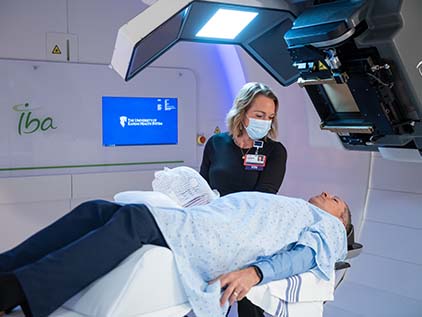Prostate Cancer Treatment
Prostate cancer treatment at The University of Kansas Cancer Center is as individual as you are. We know there are many ways to treat prostate cancer, but at The University of Kansas Cancer Center our goal is to find the balance between what is right for your cancer and what is right for you and your quality of life.
Our nationally recognized urologic surgical oncologists, radiation oncologists and medical oncologists successfully treat all stages of prostate cancer with the most advanced technology. We partner with you for comprehensive care before, during and after your prostate cancer treatment, including first access to the latest advances in prevention, screening and diagnosis, treatment and clinical trials.
Fortunately, most prostate cancers are slow growing. Even when prostate cancer appears aggressive, there is often time (up to several months) to gather the necessary information to make an informed decision about treatment.
The decision-making process can be complex, and we are here for you. Our multidisciplinary team of prostate cancer experts works together to determine the best prostate cancer treatment plan for you. A dedicated nurse navigator provides guidance and education from your initial phone call and diagnosis through treatment and survivorship.


Prostate cancer treatment options
The University of Kansas Cancer Center offers the most comprehensive and subspecialized prostate cancer program you will find. As the region’s only National Cancer Institute-designated comprehensive cancer center, and 1 of fewer than 60 nationwide, our patients have access to the most innovative therapies leading to improved outcomes and patient satisfaction.
Prostate cancer is a complex disease that requires the expertise of a team that is fellowship trained and subspecialized in only one cancer – your cancer. We know and understand the complexities of the disease that may be missed by a generalist. Because of this comprehensive, prostate-specific model of care, our patients experience higher cure rates, fewer side effects and a better quality of life.
Active surveillance
For men with lower-risk prostate cancer (low risk and certain men with favorable intermediate-risk disease), active surveillance is a non-intervention-based approach to cancer care. Currently, we recommend active surveillance for men whose cancer is not causing any symptoms, is slow growing or is small and confined to the prostate.
Active surveillance does not mean we are just “watching the cancer.” With active surveillance, we create an individualized follow-up plan using imaging and periodic prostate biopsies. The goal of active surveillance is to avoid intervention when it can be safely avoided. Approximately 50% of men who choose active surveillance (when appropriate) do not require any surgery, radiation or other therapies during their lifetime. If at any time the prostate cancer needs treatment, active surveillance ends and appropriate treatment starts. Learn more about over-treatment and active surveillance.
Focal therapy
High-intensity focused ultrasound (HIFU), also known as focal therapy, is a technology that eliminates diseased prostate tissue by directing high-intensity ultrasound waves on the affected area. The high-intensity ultrasound waves cause localized heating that destroys the cells in the gland without damaging the healthy surrounding tissue. Focused ultrasound works in the same way as rays of sunlight passing through a magnifying glass — the ultrasound narrowly focuses on the affected area, significantly increasing the temperature.
HIFU is a newer option in managing prostate cancer. It is for select men who have prostate cancer identified on MRI and whose cancer is only in the area identified by the MRI. HIFU is an outpatient procedure that takes between 45 minutes and 2 hours to perform. It is a transrectal procedure that is performed under anesthesia. After the procedure, patients can expect to return to their normal activities within a few days.
Our cancer center is the first and only in the region to offer the HIFU advanced technology. Typically, when the cancer is confined to the prostate gland, the chief treatment options are active surveillance, surgery and radiation. But surgery and radiation often lead to side effects, such as urinary incontinence and sexual problems, that can reduce quality of life.
Because of the precise targeting capabilities HIFU offers, we can destroy targeted prostate tissue while preserving the rest of the gland and avoid damage to the erectile nerves and urinary sphincter. Physicians cite up to 90% preservation of potency and similar preservation of continence.
Prostate cancer surgery
Prostate cancer patients often fear prostate surgery because of the associated side effects, such as loss of control of urinary function and impaired sexual performance.
Removal of the prostate can be performed in different ways, but the most common method is by robotic prostatectomy. During a robotic prostatectomy, we make several small incisions in the abdomen through which we insert small instruments and cameras to carefully remove the prostate. We specialize in robotic prostatectomy and, depending on the situation, can offer:
- Nerve-sparing surgery: To prevent nerve damage in those whose prostate cancer has not spread outside of the prostate gland. The nerves that control erections are attached to the side of the prostate. When appropriate from a cancer standpoint, this nerve tissue is saved and can improve erectile function recovery after surgery.
- Extended lymph node dissection: As with most cancers, lymph nodes are one of the first sites of spread with prostate cancer. During prostate removal, we can remove lymph node tissue for analysis by a pathologist to determine if spread has occurred. For men with more aggressive disease, it is important that an appropriate lymph node dissection is performed.
- Retzius-sparing prostatectomy: A modification of robotic prostatectomy that saves more surrounding tissue to reduce the time it takes to recover continence. The Retzius-sparing radical prostatectomy is a newer approach to an existing minimally invasive robotic surgery. Prostate cancer disease-specific urologists at The University of Kansas Cancer Center are the only experts in the Kansas City region who offer this advanced robotic surgical procedure that reduces unwanted side effects. During the procedure, your surgeon approaches the prostate from below rather than above the bladder, making it possible to remove the prostate in a less invasive way. Our prostate cancer specialists have seen significant improvements in postoperative incontinence rates using this newer approach. In addition to reducing unwanted side effects, robotic prostate surgery dramatically improves recovery time. Most men who have the Retzius-sparing procedure regain urinary control within a week of their catheter being removed – a milestone that traditionally takes about 6 months to achieve. Learn more from one of our patients who shares his positive experience.
- Salvage prostatectomy: A surgical procedure for prostate cancer that recurs after radiation, salvage prostatectomy may be the only remaining option for cure. For men who are treated by a different method other than surgery, such as radiation or focal therapy, recurrence can be challenging to manage. A salvage prostatectomy can be the last chance at cure for these men. This is a complicated surgery after radiation, but our team has extensive experience with the procedure.
All surgeries are unique and based on the needs and health of the individual being treated and the risk of the cancer. Our team of surgeons will guide you in what approaches may be best for you and what side effects we would expect based on the treatment. If you wish to learn more, we are here for you and a second opinion is only a click away.
Radiation therapy
Radiation is a method of treating prostate cancer without removing the prostate. During radiation treatment, the entire prostate is treated. While there are multiple ways to deliver radiation, we tailor treatment to the individual cancer.
Some men require a combination of radiation treatment and androgen deprivation therapy (ADT). ADT is hormone therapy we use to reduce testosterone levels. While testosterone is one of several male hormones that are important for a healthy prostate, it can also cause prostate cancer cells to grow and spread. Read more about our research using ADT.
Options for radiation include:
- External beam radiation therapy: External beam radiation therapy is the most common method of delivering radiation to the prostate. This involves delivery of the radiation dose from an external source through the body to the prostate. To reduce side effects and damage to surrounding tissues, we use intensity modulated radiotherapy, which optimizes the radiation dose to the targeted tissue and minimizes the radiation dose to non-targeted tissue. This approach involves daily (5 days a week) treatments for 5-8 weeks.
- Proton therapy: Proton therapy is a form of external-beam radiation that uses a different type of energy to achieve the same result as external beam. Proton therapy is a highly specialized, advanced form of radiation treatment that precisely targets tumors and spares the surrounding tissues by using a pencil-thin beam of light to deliver radiation directly to the tumor. For select men, this can deliver a more precise dose of radiation. Proton therapy is not appropriate for all cancers. Our team of radiation oncologists can help guide you in what is right for your cancer.
- Brachytherapy: Brachytherapy delivers radiation directly into the prostate in 1 of 2 ways:
- Implanting radioactive seeds into the prostate during an outpatient surgical procedure.
- Inserting temporary radioactive rods into the prostate and remove them at the end of the procedure.
Both delivery methods can increase the dose of radiation the prostate receives while reducing the radiation dose to surrounding tissue.
- Stereotactic body radiotherapy: For select men with lower-risk disease, stereotactic body radiotherapy delivers a very high dose of external beam radiation therapy in fewer sessions (5 total) than traditional radiation and reduces your overall radiation dose. Learn more from one of our patients who shares his positive experience with SBRT.
In addition, prostate cancer treatments may involve the use of image-guided radiation to improve accuracy. One example is 3D conformal beam radiation, which uses special computers to precisely map the location of your prostate. Radiation beams are then shaped and aimed at the prostate from several directions, which makes them less likely to damage surrounding normal tissues and organs. Your treatments may also include the use of additional agents such as SpaceOAR™ (rectal spacers temporarily implanted to reduce the risk of rectal radiation). Treatments may also involve prostate cancer immunotherapy and hormone therapy.
Systemic treatment
Systemic treatments are drug therapies that work throughout the entire body. They can be given as an injection, infusion or oral medication. They include chemotherapy, hormonal treatment, targeted therapy or immunotherapy. The type of treatment we give will depend on the type of cancer. In prostate cancer, there are a number of systemic treatments that we use depending on patient’s diagnosis:
- Androgen deprivation therapy, or ADT, is a method we use to reduce testosterone levels, either in combination with radiation or as a long-term treatment in advanced disease. We do this using an injectable medication (in durations of up to 6 months between doses), daily oral medication or as a surgical procedure.
- Advanced hormonal manipulation is a treatment we may use in men with advanced disease when ADT alone is not enough. There are other agents which focus on how testosterone works that we can use to improve outcomes. Typically, the medications we use either interfere with the synthesis of testosterone or prevent testosterone receptors from being activated. Hormone therapy uses drugs to block or alter hormones to help slow or stop the growth of certain types of cancer. Hormone therapy is a systemic treatment that circulates throughout the body.
- Chemotherapy is a treatment we use in advanced prostate cancer in combination with ADT. Chemotherapy uses anti-cancer drugs to destroy prostate cancer cells. The drugs circulate throughout the body in the bloodstream.
- Immunotherapy involves medications that work with the immune system to help fight cancer. For select men with prostate cancer, we may use immunotherapy.
- Radiopharmaceuticals are medications that emit radiation and can be used in theranostics treatment. To treat prostate cancer, there are 2 medications we use, Lutetium-177 PSMA, also known as Pluvicto®, and Radium-223.
- Theranostics is a precision medicine approach to care that combines “therapy” and “diagnostics” in its name and in practice. The treatment uses the same targeting system to both find disease (diagnostics) in the body and treat it (therapy) using radiopharmaceuticals. By delivering radiation directly to diseased cells, it treats disease more precisely, minimizes damage to healthy tissue, and results in few, if any, side effects.
- Targeted therapies are cancer treatments that target proteins that control how cancer cells grow, divide and spread. Targeted therapy is the foundation of precision medicine. As we learn more about the DNA changes and proteins that drive cancer, we are better able to design treatments that target these proteins. Our prostate cancer medical oncology team is here to guide you through these treatments and their side effects. If you or a loved one has been diagnosed with prostate cancer, we are here. To speak with a nurse navigator, call 913-588-3671.
Watch Bench to Bedside and hear our experts discuss the latest advances in prostate cancer treatment.
Clinical trials
As an NCI-designated comprehensive cancer program, one of the missions of The University of Kansas Cancer Center is to advance the science of cancer treatment. We do this through clinical trials, which are scientific studies that lead to new ways to treat, detect and prevent prostate cancer. Our prostate cancer program has open clinical trials designed to treat different types of prostate cancer. As a clinical trial participant, you have the opportunity to receive treatments you might not otherwise have access to and you’re also helping to advance cancer care. Talk to your doctor if you are interested learning more about taking part in a clinical trial.

More options, more hope
Many new therapies are available through clinical trials. Find out how you may benefit from a clinical trial, and what it can do for others.
Start your path today.
Your journey to health starts here. Call 913-588-1227 or request an appointment at The University of Kansas Cancer Center.